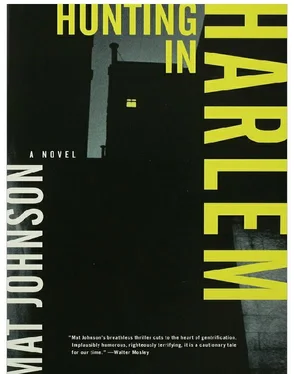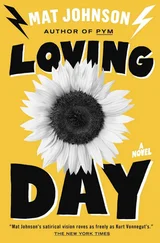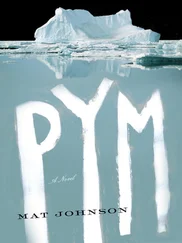The situation had started to gain comic momentum when the #3 bus came down the street towards them. Who am I to choose? Snowden asked himself, and then ran back to get his compatriot. It actually stopped. The driver actually waited for Snowden to drag Horus on board, he even dropped the hydraulic lift a bit to help them climb up. As they started moving, Snowden dug through Horus's pockets for the change that would save them. That's what it took to wake Horus up. "Cheap bastard," Snowden cursed at him.
Snowden had always heard that New Yorkers never pay attention to anything, that no one will look up to stare at even the most extreme irregularity. This rumor was entirely untrue, spread by someone with a fairly rigid idea of normalcy. You take a guy in an extremely dirty ninja outfit two sizes too small for him, add a barely conscious man whose face is bleeding so much you can't differentiate the skin from the meat, stick them both on a downtown bus at half past three in the morning, you'll see people staring. Staring shamelessly. Snowden stared back at them, refusing to take off his mask till after they got off at 125th Street. What the hell were they looking at in the first place? Had they no concept of the creatures these men had just rid the world of? Who were they, to look at these men like that? What kind of people rode a bus through Harlem at three-thirty in the morning, anyway? Snowden wanted to know. He and Horus were not the problem elements on the bus, most certainly. Snowden looked around from under his black hood, and he could identify the people who needed to go immediately. "Her, him, and him," he said out loud to no one. It was so obvious. All you had to do was knock them off and then their little mobile community would be heaven.
THE SAD TRUTH was that the little runts couldn't write worth a dime, let alone the thirty-five cents an issue they were charging. Sitting behind the fortress of her large wooden desk, face to face with them at their little plastic ones, Piper looked out and silendy resented them for their illegible prose, their erroneous grammar, the fact that they seemed to find it impossible to sit still for more than two minutes or keep from yawning at least long enough for her to turn to the blackboard. Piper kept saying to herself, Give them a break, they're sojoung, and as guilty penance even made a rare call to Abigail Goines, put up with several reminders of why she rarely called to get her box of childhood writing samples sent down express to her. A bad idea, it turned out. For one thing, asking her mother to go into the attic for one box started the discussion about all of the others Piper had quietly decide to leave there, but more disturbing was the quality of her own adolescent clippings. When Piper was eleven years old she was writing comparative essays on the difference among private, public, and home school education, pondering the larger sociological significance of the Emmanuel Lewis — Gary Coleman miniaturized Negro craze, and experimenting with present-tense second-person-singular in her review of the double-loop roller coaster at Great Adventure ("You feel the bar press down upon your lap cold and hard. As your car goes into free fall your grip on that metal is colder and harder because you know no matter how loud you yell no parent nor teacher can save you."). Now, as a teacher herself these decades later, the most impressive submission Piper Goines had received from her class was "That X-Men Cartoon Isn't Real," which distinguished itself not by its prose, or even by managing to spell the majority of its words correcdy (it didn't), but for the utterly original proof on which it based its thesis: the fact that there were discrepancies in character age, team composition, and story line between the cartoon and the comic book version, which the author took as the definitive, factual text.
At first, Piper was convinced she'd been stuck with the "special" class, that the hidden clause in Marks's offer was that she spend the year baby-sitting the runts of the Little Leader litter. After a while, though, their editor realized they were too well behaved for that group, and the ones who did act a fool were quickly removed. An advocate of not naming names, Piper hadn't even reported the boy who'd decided it was appropriate to use the class tape recorder to preserve a repetitive, derivative string of expletives for posterity, yet the boy, like all the other discipline problems Piper had encountered over the weeks, never appeared for class again. When asked where their housemates had disappeared to, her remaining students explained that the bad kids had to go out on the street and sell candy bars to raise money. Having read their work, Piper thought that was probably a better career path for them, anyway. Regardless of how many disappeared, the class continued to grow. Piper was sure there'd only been a little more than a dozen when she started.
They were good kids, for kids, Piper came to realize. They were just poorly educated and talendess, even for nine- to twelve-year-olds. Though, to be fair, the last bit was hard to say, for most lacked the basic skills necessary for style, although Piper still had her suspicions. After reading their papers, after all her self-pity that her lot had been linked by fate to their own had subsided, Piper cursed the New York City public school system for failing them. It was a large, slow-moving target and therefore should have been perfect for assault, but Piper found it lacking in its ability to carry the full burden for her writers' inadequacies. There were parents to be blamed. It was inevitable. Regardless of whatever tragedy had created these orphans, those parents dead or missing could not avoid responsibility for much of it. Even destitute, Abigail Goines would never have let her daughters wallow in ignorance. Of course, Abigail Goines was the product of middle-class education and values and wasn't faced with the challenge of breaking free from poverty and ignorance in the first place.
In Abigail Goines's place, these kids had Horizon Property Management, and they didn't even know how lucky they were. Scholarships, private tutoring, one of the wanna-be Eliza Doolittles even wrote a somewhat legible piece mentioning a proper speech and manners course. Their misfortune was their greatest asset. That's how Piper's book would start, the one she sat in class and imagined herself writing on the Horizon Little Leaders League after she seized control of the New Holland Herald. Piper would donate her advance back into the program, use the publicity tour to cross promote the Herald, so everyone's interest would be served. Young, innocent, harmless black orphans saved from the ghetto during their darkest hour, led by a young, attractive, affluent person from the suburbs who believed in them so that they could believe in themselves. Hollywood put a movie out like this every four years, so this would be the next one. A descendant of Lassie would be bred to fill the role of that mutt that insisted on lying in a long smelly pile by the front door every class. Of course, they would insist on putting a Caucasian savior in the "Piper" role, so Piper'd put a racial bonus clause in the contract as a trap for them.
Piper was planning a speaking tour in her head when one of the boys in the back raised his little suited arm, tie hanging out like a lascivious tongue on the desk before him, and yelled, "Yo! It been time to go!" All the other children turned to look at him, shaking their heads. Piper took a good long look at him too, figuring she'd never see him again, then looked around the room to try and guess which snitch would rat him out first.
Bag packed, the anticipated Chinese take-out entree already haunting her mouth, Piper turned back to the room to see that one seat had not been emptied. The dog, awakened by the commotion, sat proudly before this little boy. The Harlem Outcry's star political cartoonist, who didn't know a thing about politics but whom Piper had to admit was really good at drawing monsters and superheroes, for his age group. He was a true artist, effete and everything.
Читать дальше












